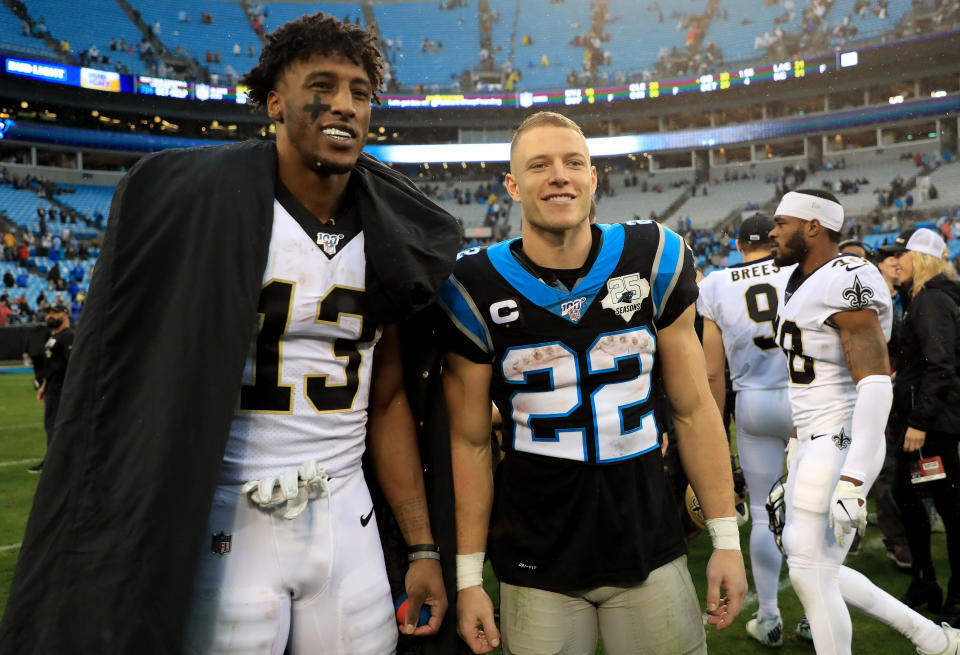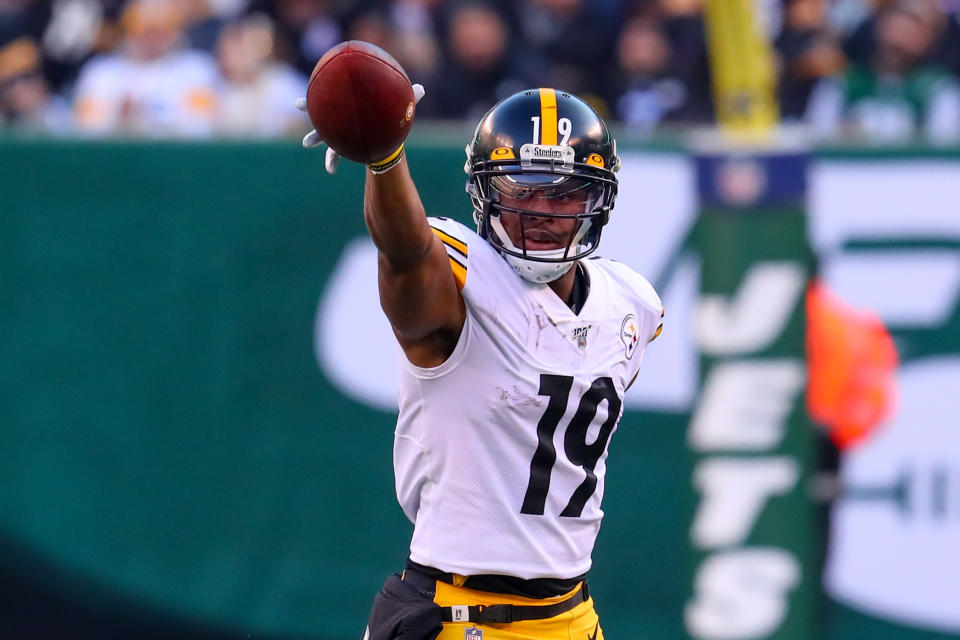'Fantasy has allowed certain players who were not known to become known:' How fantasy football builds a unique bond between player and fan
No one can deny the reality that fantasy football has fueled greater interest in the game of football. With increased engagement and eyeballs on the product comes a boost to what drives all things: revenue. You can put dollars and cents to the equation. That conversation can be illustrated by a line graph, one that would show a variety of directions heading upward.
The revenue boost from fantasy football brings us all countless benefits. For starters, I’m employed because of it. I get to write these words on the digital paper, and every two weeks someone cuts me a check for doing it ... which is still weird. The actual players on the field see their checks get fatter as a result, too. The business of football is booming, so the salary cap and player wages continue to rise. Fake footballers at home continue to enjoy products and services catered to them, with more content offerings and more game options designed for fantasy managers popping up every year.
Beyond the idea of brass-tacks benefits and dollar signs, there is another, perhaps more powerful albeit less tangible, asset that fantasy football brings to the game.
It really dawned on me during a conversation with then-Jaguars and current Bears wide receiver, Allen Robinson, coming off his 14-touchdown 2015 season.
When I asked how his life had changed following that massive breakout campaign, Robinson organically brought it up before anything else, saying, “More so on the fantasy side, just being noticed a bit more.”
At the time, Robinson played for a small-market team coming off a 5-11 season and was well outside the national conversation throughout the prior year. Yet, as Robinson noted, no matter where he went in the country he was recognized by fans all over. Not necessarily as the great wideout of the Jacksonville Jaguars, but as the guy who helped them win their fantasy league.
Essentially, fantasy football has helped expand the universe of NFL fandom. It’s extremely rare that a fan in this day and age is solely focused on just “their team” and the players on it. League followers are tracking players across the entire NFL. As a season plays out, the fans build a connection with the players on their fantasy team that would not have existed otherwise. It forms a sort of bond and, even better, the players know about it and acknowledge this exists.
You can choose to focus on the negative interactions between fantasy gamers and NFL players; they are real, numerous, and entirely gross.
However, this connection and newfound following built for the players, thanks to fantasy football, is far more powerful.
Christian McCaffrey, Derrick Henry and more speak on fantasy football
Former Chargers tight end Antonio Gates was at the peak of his time in the league when fantasy football popularity was beginning to soar. “Fantasy was the league that kind of put me on the map,” Gates told me while reflecting on the impact the game had on his career.
Finding a good, steady tight end can be an absolute chore for fantasy football managers. Rarely do we find a true difference-maker whom we lock into lineups every week. Gates acknowledges his place as one of the first to ever do it. When he arrived on the scene in the mid-2000s, he says of his position: “Tight ends weren't really recognized. They weren't known.”
He takes pride in his place as a pioneer. “When I got to [the] league catching touchdowns all of a sudden, that became, ‘Wow, tight ends are catching touchdowns right now!’ [Now,] they are really something you have to really be concerned with now. You know, before then, when I got to the league, it was just ... you didn't know a handful of tight ends. You knew the position was part of the game, but everything was receivers, running backs oriented.”
For his prowess at a position that rarely features consistent stars like he was, Gates quickly gained notoriety from followers. “Fantasy has allowed certain players who were not known to become known. Particularly myself.” A bond was quickly forged, even if it wasn’t always expressed in the most convenient places. “Had it not been for fantasy,” Gates said with a laugh, “I would go places ... and I've heard guys say, ‘Hey, I need you to get back,' you know what I mean? [I’ve] never been recognized in my life. Like, I'm pumping gas!” He looks back on these memories fondly, weird as they are, and chalks them up as a relationship with people who otherwise wouldn’t know Antonio Gates, tight end for the Chargers, even existed.
As the popularity of fantasy has grown, this connection has become only more pronounced. When asked about this phenomenon, Christian McCaffrey told me quickly: “I appreciate all my fantasy football fans.” Despite coming off one of the best fantasy seasons we’ve ever seen, he even offered a note of regret: “Hopefully my fantasy followers are happy with me. I apologize for the bad games.”
It was with rapid reaction time I told Christian McCaffery, with his 1,000 rushing and receiving yards, that he did not owe a single human being who had him on their fantasy football roster an apology.
Even if McCaffrey doesn’t know much about how any of this world works, he knows it’s been a tremendous boost. “Fantasy football has been great for me. And I don't play. I don't know anything about fantasy football or how it's scored. I just found out before this what PPR is.” He said he’s specifically heard from fans of that format often: “I didn't know what it was, but I have a lot of people who tell me how much they appreciate me from their PPR league. And I just said ‘Thank you.’ I had no idea what that meant.”
Christian and I got into a brief discussion about the differences between scoring formats, like full- and half-point per reception. He interjected with a hilarious initial theory: “I didn’t know if it was some cult following. I just know ball's in the air, catch it, try to put the ball in the end zone and go from there.”

Derrick Henry is another running back who, like McCaffrey, is coming off an awesome fantasy campaign. Starting from his dominant December of 2018, Henry has started to notice more followers coming his way, beyond just those in the Tennessee Titans fanbase.
With a gleam, Henry told me, “I appreciate all fans!” NFL players sacrifice so much of their health in order to play this game. The punishment is doled out weekly, especially at the running back position, and is often unforgiving. As a result, feeling the gratitude of their collection of devotees can often be that extra step of fuel for a player like Henry. “That's one thing about this game, and that's what you love. People who admire your talents, who appreciate your talent, and people who support you. And fantasy football is another way for people to do that.”
Beyond just cultivating a new group of admirers, both of these star backs recognize fantasy is an avenue to bring new diehards under the NFL umbrella.
“I think fantasy football it's good and bad for the game,” McCaffey told me. “I think it brings a lot of fans to the game, and I think that's amazing.” He even went so far to suggest folks who don’t even love the actual game could be brought into the faux word the contests create, saying, “People who don't necessarily watch football, it gives them something to appreciate.”
Henry echoed McCaffery’s sentiments, “It's another way to get fans more involved in the game and get them more excited.” The NFL’s leading rusher alluded to that connection that fans get to build with these stars. It comes from the engagement that’s fostered on both social media and through real-life encounters. The gratitude expressed and appreciative messages do not go unnoticed. Those moments feed into the excitement Henry can sense from those observing the games.
“The connection is clearly there. And the exciting reality is that this is still an on-going process ...”
Steelers wide receiver JuJu Smith-Schuster has come of age in the era of social media and fantasy football primacy. Those platforms have helped him reach a level of recognition that goes beyond the football field. He spoke to the connection with: “A lot of fans who basically [tweet me] ‘Yo, JuJu, I need you to get this many points for us to win the game or for us to win this week.’ I think it's pretty interesting. But at the same time, it's also fun.”
No question, some players simply don’t care about or straight-up don’t like the messages from fantasy football players. No one should quibble with that. It truly has nothing to do with their day-to-day preparation for an upcoming game or the grind to get ready for an entire season. And we should all universally condemn the jackasses who feel the need to degrade players for not getting their fake team enough points after games have ended. However, for some players, especially the younger guys growing up in this era, it adds another layer of fun and is verifiable proof of this connection we’re speaking of here.
Smith-Schuster doesn’t mind the messages going into games — he just has one request: “If I’m playing on Monday night, and [they tell me], ‘You're my last chance, I need 28 points to win,’ I'm like ... come on, guys. Let's be realistic.”

The connection is clearly there. And the exciting reality is that this is still an on-going process, something that’s still developing. In fact, this connection can even help grow fans’ knowledge about the game. As they deepen their bond with players by rooting for them, the athletes can only hope they learn more of their perspective.
Vikings wide receiver Stefon Diggs expressed that desire when it comes to his interaction with fantasy football players. When I asked him what the biggest misconception is about the wide receiver position, he responded with: “More so towards fantasy football because they want production out of a lot of people when, you know, a lot of different situations are different. Like, you can see a situation like — like a great receiver, Michael Thomas, but also gets a lot of targets, you know? And different people are on different teams. So you might not get as many targets this week. Or you might not get as many targets another week ... like, my team I'm paired with another exceptional receiver. And I have a great running back. And I got a great tight end, like, guys that can make plays on the ball. Not saying that he doesn't have those guys, but different people have a different amount of targets, and, you know, there's a lot of that — a lot of things that you need to go right.”
I posed the same question to Texans All-Pro wideout DeAndre Hopkins and he followed the same chord, saying, “What the average fan wouldn't understand about a receiver is that they can impact the game without getting the ball or they can really impact the game without having 100 yards or a touchdown.” This illustrates an area where fantasy football and reality diverge. The wide receiver’s job is to help his team win the game. If that involves putting up massive numbers in the box score, great. But if it doesn’t, that isn’t of consequence to these players.
Hopkins continues: “A good receiver, a great receiver has a real big impact on a football game. If there are nine guys in the box and this receiver's one-on-one, he's gonna get the ball more than likely. But if there is a safety cheating over, then that helps out the run game, which is huge. So one receiver can really impact the game without getting the ball or a lot of touchdowns or a lot of yards.
A lot of what I aim to do with Reception Perception comes from trying to deepen fans’ understanding of the wide receiver position. By charting who is getting open on a route-by-route basis, we can better realize which wide receivers are playing extremely well, even when it is not reflected in the box score. When I explained this idea to Hopkins, he agreed: “Exactly. Exactly. And as a receiver, we take pride in that. We take pride in impacting the game without getting the ball. Blocking or having extra coverage because that's gonna open up the run game or help someone else get open.”
[Yahoo Sportsbook powered by BetMGM: Deposit $10, Get $100 in Free Bets. NJ only. 21+. Terms apply]
Smith-Schuster also intimated that beyond-the-boxscore impact can be tough for fans to understand. He spoke to his own experience this season: “Not having Antonio Brown, so obviously that changed a lot with coverage-wise, playing against the No. 1 corner, going against the double teams and all that. That was a little bit of a big difference that everyone [may not] see. But I've learned to grow from that and just naturally adapt to it throughout my season.”
“Fantasy football has made the sport of football better.”
There are ways that we can learn and grow our understanding of the game from the players we’ve evolved to become fans of that we would never have followed in the days before fantasy football — ways to strengthen that connection. The hope is that with it, and the fantasy fan's insatiable desire to consume endless amounts of content about the NFL, we can all become smarter about the sport we love.
Nevertheless, the connection is real. The player who was around from the onset of it, when it began seeping into our culture, summed it up perfectly: “At the end of the day, it allowed you to be connected as a GM, or an owner, as some type of way, with the players,” Gates said. “So even though you might not [normally] recognize a guy, a guy could come in here, and you'll be like, ‘You're the guy that scored all those points last week. You won the championship for me.’”
Fantasy football has made the sport of football better. Not only has revenue, and therefore opportunity, increased across all segments within the league, it’s helping us — with the players’ assistance, hopefully — get smarter about the game.
Through it all, the most consequential aftereffect of the rise of fantasy football remains this newfound bond between fantasy managers and the players we never would have been gravitated to without our fake teams.
Focusing on fostering this while looking to weed out the small negative interactions fantasy can bring between players and fans will only make the entire experience grow stronger.
As future Hall of Famer Antonio Gates concluded at the end of our chat: “So now you are connected. It's been a great instrument for that particular role it's played in players' lives, and the fans.”
What do you think of this connection between real-life player and fantasy manager? Let us know in the comments below, and follow us @YahooFantasy and Matt @MattHarmon_BYB


